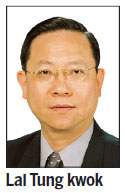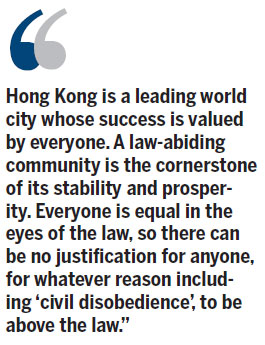What 'Occupy Central' may mean for HK
Updated: 2014-06-12 06:42
By Lai Tung Kwok(HK Edition)
|
|||||||
The "Occupy Central" campaign has aroused considerable concern in Hong Kong. According to the Ci Hai Chinese dictionary, the meaning of the verb "to occupy" is to forcibly take possession of physical space; or to forcibly take control of a territory or a position. The word "to occupy" has important implications, such as whether it will affect people's living, social order, and the normal operation of the financial, industrial and commercial sectors including the hotel and tourism businesses, the financial stability of our economy and local and foreign investment.
As secretary for security, I have the responsibility of explaining the nature of the "Occupy Central" movement and its potential impact on society, to the public.
An unlawful act

In an article entitled "The Most Lethal Weapon of Civil Disobedience" published in the Hong Kong Economic Journal on January 16, 2013, University of Hong Kong Associate Law Professor Benny Tai advocated non-violent civil disobedience. It is the intention of "Occupy Central" that as many as 10,000 protesters will assemble, unlawfully, with the aim of blocking the main thoroughfares of Central district. The group hopes that the campaign will last for some time, and that it will paralyze the political and commercial heart of the Central business district. The ultimate aim of the campaign is to force the central government to accede to their political demands.
"Occupy Central" has the support of Chinese University of Hong Kong Associate Professor Chan Kin-man and Hong Kong Alliance in Support of Patriotic Democratic Movements of China Standing Committee member Reverend Chu Yiu-ming.
But many people in Hong Kong do not understand the legal implications of the "Occupy Central" campaign. They also don't realize that its organizers may not be able to keep it under control. They have not fully considered the potential consequences. The protests could become violent. Benny Tai noted that "Occupy Central" was a campaign of massive "disruptive power". He said it was anticipated that the campaign would include the following elements:
1. A large number of protesters. As many as, say 10,000, may oblige the police to use large numbers of officers and ensure the government does not find it easy to deal with the campaign.
2. The campaign will be one of civil disobedience.
3. It will break the law, but will not involve violence.
4. Resources will be used to block the main roads in Central. A broadcast center, including the use of the media and the Internet, will be set up to communicate with the public and the world at large with the intent of putting further pressure on the government.
5. Civil disobedience is unlawful; participants will be asked to sign a disclaimer stipulating that they will accept legal liability for their own actions, to surrender themselves to the police if required to do so, and to allow the authorities to determine whether or not they will face prosecution.
On March 27, 2013, the three organizers of the campaign unveiled the "Occupy Central" manifesto. This included a modification to principle No 5 listed above; it said that individuals would be free to participate in different ways:
1. They could pledge their support alone - i.e. without the need to undertake unlawful acts.
2. They would not be required to surrender to the police voluntarily following the blockade or to file a plea of "no defense" at their subsequent trials.
3. However, they would be free to surrender to police and file a plea of "no defense" at their trials should they wish to do so.
In his article entitled "What Offences Could Be Committed by 'Occupy Central'?" published in Chinese on May 24, 2013, Benny Tai admitted that "occupying Central by civil disobedience" was a law-breaking act. Participants might commit the following offences:
Section 4A of Summary Offences Ordinance: Any person who may obstruct, inconvenience or endanger, any person or vehicle in a public place shall be liable to a fine of HK$5,000 or to imprisonment for three months.
Under Section 7 and Section 17A(2) of the Public Order Ordinance, the "Occupy Central" should be considered as an unauthorized assembly. As such, Section 17A(3a) of the Public Order Ordinance will apply: that every person who, without lawful authority or reasonable excuse, knowingly takes or continues to take part in any such unauthorized assembly shall be guilty of an offense and shall be liable to imprisonment for five years on conviction on indictment; and to a fine of HK$5,000 and imprisonment for three years on summary conviction.

Unlawful assembly which contravenes Section 18 of the Public Order Ordinance: When three or more persons, assembled together, conduct themselves in a disorderly manner to cause any person reasonably to fear that the persons so assembled will commit a breach of the peace, or will by such conduct provoke other persons to commit a breach of the peace, they are an unlawful assembly. Anyone found guilty shall be liable to imprisonment for five years on conviction on indictment; and to a fine of HK$5,000 and imprisonment for three years on summary conviction.
The article also mentioned that the penalty for persons on first conviction will likely be a fine or a few weeks' imprisonment or a suspended sentence. In other words, the organizer has admitted that "occupying Central by civil disobedience" is a law-breaking act. So the illegality of "Occupy Central" is in no doubt.
No one is above the law
Hong Kong is a leading world city whose success is valued by everyone. A law-abiding community is the cornerstone of its stability and prosperity. Everyone is equal in the eyes of the law, so there can be no justification for anyone, for whatever reason including "civil disobedience", to be above the law.
Recently, there has been extensive media coverage about a case in which the Court of First Instance of the High Court reduced the sentences imposed on legislators Raymond Wong and Albert Chan who were convicted of unlawful assembly (HCMA 453/2013) to a fine. The presiding judge in his judgment quoted the trial magistrate's "The Reason for Sentence" (Note 2) as follows:
"Unless the court ruled that the law has violated the Basic Law or human rights, there has never been a single law in Hong Kong that people can choose to abide or not to abide. Even those with strong views on certain social issues should still be held liable for contravening criminal offences. No one is above the law, or else the rule of law as a core value of the society would be undermined Freedom of speech and freedom of demonstration and protest are the core values of Hong Kong, but the rule of law is equally important. Any unlawful or non-peaceful assembly could entail a tendency or a risk to jeopardize the rule of law in an open and extensive manner. The rule of law must not be jeopardized because instability is detrimental to the development of the society."
"Occupy" may lose control
Do the organizers of "Occupy Central" have the ability to maintain the movement's non-violent nature? In view of the opinions recently expressed by various sectors of the community including the radical groups in media reports, I believe the answer is eminently clear.
After the Taiwan students' occupation of the island's "Legislative Yuan" and the "Executive Yuan", various groups in Hong Kong said they would be willing to occupy or besiege landmarks in the city, including the Central Government Offices and the Legislative Council. In an article entitled "Occupy Legislative Council and Occupy Central" by Benny Tai, which appeared in the Apple Daily on March 25, 2014, he said; "In fact, there is no monopoly in taking protest actions. Occupy Central is not and should not be the only form of protest action by Hong Kong people Protests will be diverse. Apart from the occupy movement, there will be various forms of protests. Not only in Central, the movement may take place in other locations including the Legislative Council ... People will organize their own form of protests in support of each other to generate the greatest political effect."
On April 15, 2014, Apple Daily published another article by Benny Tai, "In Response to Queries of Older Generation on Occupy Central" in which he pointed that "Occupy Central" is a rally. They, being the organizers, could not guarantee the rally will be absolutely peaceful.
I would also like to quote part of a Ming Pao editorial entitled "The Radicals Alter the Nature of Occupy Central. Do Not Incite the Public to Be the Porter" published on May 24, 2014.
"Although the organizers of the Occupy Central do not agree that the movement has been hijacked ... the development of the movement is running counter to their subjective good intention. Now the radicals have taken over Occupy Central with only the proposals containing the element of civil nomination screened in and all the moderate proposals deliberately eliminated. The moderates have been marginalized and served as a foil to the radicals ... According to the records, demonstrations held by the radicals have usually ended up in a disorderly manner ... It is hard to believe that the radicals would scrupulously abide by the peaceful and non-violent principle when Occupy Central takes place ... Hence, people who encourage the public to vote on June 22 should explain clearly to the public so that they are fully aware of their choices and will not lend unjustified support to the radicals."
Radicals may hijack the movement and transform peaceful public protest to violent protest - deviating from the original plan of the organizers. During the Legislative Council Finance Committee meeting held last Friday to examine the funding proposals for advance site formation and engineering infrastructure works at the Kwu Tung North New Development Area and the Fanling North New Development Area, the radicals broke into the Legislative Council by force. The incident clearly shows how a peaceful demonstration can lose control, resulting in the emergence of a violent crisis.
As Secretary for Security, I believe it is difficult to predict how the "Occupy Central" campaign will develop. Once violent confrontation occurs, things could easily get out of control.
However I would like to remind the public that if they contemplate joining the movement, they should also carefully consider their own personal safety and the question of legal liability.
We will ensure that Hong Kong's law enforcement agencies act in accordance with the law. But we will take robust action to uphold the rule of law and to maintain public order and safety.
The author is the secretary for security of the Hong Kong SAR Government.
(HK Edition 06/12/2014 page9)